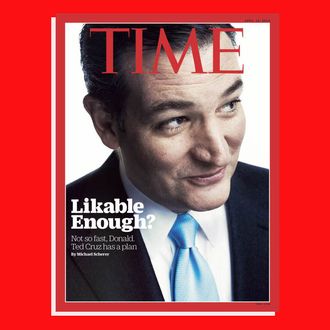
There are few words in the political lexicon more frequently misused and abused than populist, particularly in times of strong public hostility toward elites, like the present. Still, Time magazine has truly jumped the shark in publishing an interview with Ted Cruz in which he is encouraged without contradiction to call himself an “economic populist.” If Cruz is an “economic populist,” then the term has truly lost all meaning beyond the pixie dust of rhetorical enchantment.
We are supposed to believe Cruz is a populist because he opposes a few relatively small but symbolically rich corporate-subsidy programs like the Export-Import Bank and regulatory thumbs-on-the-scale for the use of ethanol — both objects of ridicule among libertarians for decades. In the Time interview, he leaps effortlessly from the argument that sometimes government helps corporations to the idea that government should not help anybody.
[B]oth parties, career politicians in both parties get in bed with the lobbyist and special interest. And the fix is in. Where Washington’s policies benefit big business, benefit the rich and the powerful at the expense of the working men and women.
Now the point that I often make, and just a couple of days ago in Wisconsin I was visiting with a young woman who said she was a Bernie Sanders supporter. And I mentioned to her that I agreed with Bernie on the problem.
But I said if you think the problem is Washington is corrupt, why would you want Washington to have more power? I think the answer to that problem is for Washington to have less power, for government to have less power over our lives.
Is there any K Street or Wall Street lobbyist who would not instantly trade whatever preferments they’ve been able to wring from Washington in exchange for a radically smaller government that lets corporations do whatever they want? I don’t think so.
Yet it’s hard to find a politician more inclined to get government off the backs of the very rich and the very powerful. My colleague Jonathan Chait summed it up nicely this very day in discussing Cruz’s Goldwater-ish extremism:
In addition to the de rigueur ginormous tax cut for rich people, Cruz proposes a massive shift of the tax burden away from income taxes to sales taxes. So, not only would Cruz’s plan give nearly half of its benefit to the highest-earning one percent of taxpayers (who would save, on average, nearly half a million dollars a year in taxes per household), but it would actually raise taxes on the lowest-earning fifth …
He advocates for … deregulation of Wall Street, and would eliminate the Clean Power Plan and take away health insurance from some 20 million people who’ve gained it through Obamacare. He has defined himself as more militant and uncompromising than any other Republican in Congress, and many of his fellow Republican officeholders have depicted him as a madman.
Cruz would have you believe his unsavory reputation among Beltway Republicans flows from his identification with the working class as opposed to the special interests. As a matter of fact, he’s considered a madman (or a charlatan) for insisting Republicans ought to shut down the federal government rather than compromise or abandon their anti-working-class policies (and their reactionary social policies as well).
Aside from the policies Chait mentions, Cruz also favors (in contrast to Donald Trump) that populist perennial, “entitlement reform,” including the kind of Social Security benefit cuts and retirement-age delays promoted by George W. Bush back in 2005.
And for dessert, in a position that would certainly make William Jennings Bryan roll in his grave, Cruz is on record favoring tight money policies to combat the phantom menace of inflation, along with a commission to consider a return to the gold standard.
One might argue the description of Cruz as an “economic populist” is a small journalistic excess justified by the heat of the GOP nominating contest. But in a general-election matchup between Cruz and Hillary Clinton, we could find ourselves hearing misleading contrasts of Cruz as a “populist” to Hillary Clinton, the “Establishment” pol. Let’s head that one off at a distance, people. Whatever you think of her set side by side with Bernie Sanders, compared to Cruz she’s a wild leveler and class-warfare zealot, favoring minimum-wage increases, more progressive taxes, large new mandates on businesses, continuation and expansion of Obamacare, action on global climate change, a constitutional amendment to overturn Citizens United, and (of course) opposition to the many reactionary policies Ted Cruz holds dear.
Get a grip, gabbers and scribblers: Call Ted Cruz a “constitutional conservative,” as he would have it, or the reincarnation of Barry Goldwater, as many of us regard him. But he’s no economic populist.






























